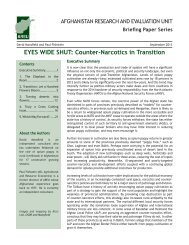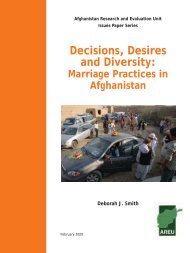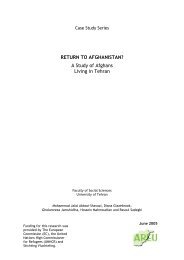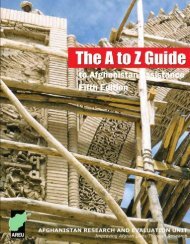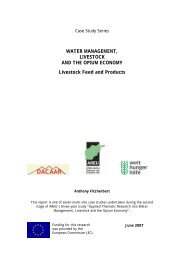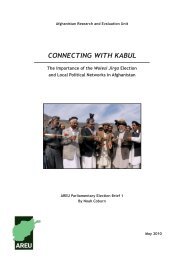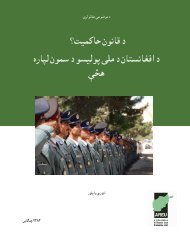Local Governance in Afghanistan: A View from the Ground
Local Governance in Afghanistan: A View from the Ground
Local Governance in Afghanistan: A View from the Ground
- No tags were found...
You also want an ePaper? Increase the reach of your titles
YUMPU automatically turns print PDFs into web optimized ePapers that Google loves.
<strong>Afghanistan</strong> Research and Evaluation Unit<br />
2011<br />
Communities greatly appreciated WFP’s “Food for Education” programme. It has resulted <strong>in</strong> <strong>in</strong>creased<br />
school enrolment and attendance, particularly of girls. Many said that even if aid were withdrawn,<br />
attendance would not be affected s<strong>in</strong>ce people had come to realise <strong>the</strong> value of education. The food<br />
for tra<strong>in</strong><strong>in</strong>g programme has also contributed to <strong>the</strong> <strong>in</strong>crease of female teachers. More generally, <strong>the</strong><br />
“Food for Work” programmes have provided a boost to economies <strong>in</strong> some of <strong>the</strong> poorest regions<br />
of <strong>the</strong> country. 57 Respondents drew attention to <strong>the</strong> role of DDAs and o<strong>the</strong>rs <strong>in</strong> <strong>the</strong> distribution and<br />
monitor<strong>in</strong>g of <strong>in</strong>puts. Active DDAs would store aid and make lists of recipients, and distribution often<br />
took place <strong>in</strong> <strong>the</strong> presence of local government officials.<br />
However, our research evidence <strong>in</strong>dicates that <strong>the</strong>re are also repeated <strong>in</strong>stances of WFP aid be<strong>in</strong>g<br />
siphoned off by those responsible for its delivery, monitor<strong>in</strong>g and distribution. Those complicit <strong>in</strong>cluded<br />
woluswals, MoE officials, chiefs of police, DDAs and even on occasion <strong>the</strong> NDS. Commonly one third<br />
of food, but sometimes more, would be taken and sold <strong>in</strong> <strong>the</strong> bazaar to be bought by <strong>the</strong> very people<br />
for whom <strong>the</strong> food was <strong>in</strong>tended. O<strong>the</strong>r fraudulent practices <strong>in</strong>cluded generat<strong>in</strong>g fake muster rolls for<br />
labourers or creat<strong>in</strong>g ghost students. Sometimes consignments would be sold and lower-quality wheat<br />
bought and distributed. In one <strong>in</strong>stance an entire consignment of milk powder was taken and sold by<br />
a woluswal. Although <strong>the</strong>se issues were sometimes reported to <strong>the</strong> wali, no action was ever seen to<br />
be taken. S<strong>in</strong>ce DDA members do not receive salaries, it appears regularly to be <strong>the</strong> case that lead<strong>in</strong>g<br />
members were exploit<strong>in</strong>g <strong>the</strong>ir positions for personal benefit, ei<strong>the</strong>r through <strong>the</strong> sale of food, or divert<strong>in</strong>g<br />
aid to <strong>the</strong>ir own communities, and sometimes both. It can only be deduced that <strong>the</strong>se opportunities for<br />
ga<strong>in</strong> were a reason for <strong>the</strong> cont<strong>in</strong>ued operation of rump DDAs where <strong>the</strong>y were not o<strong>the</strong>rwise active.<br />
5.3 Nongovernmental organisations<br />
Nongovernmental actors have made a substantial contribution to <strong>the</strong> achievements that have<br />
taken place s<strong>in</strong>ce 2002 <strong>in</strong> respect of health, education, rural development, civil eng<strong>in</strong>eer<strong>in</strong>g and<br />
construction. This <strong>in</strong>cludes a number of <strong>in</strong>ternational NGOs (INGOs) present <strong>in</strong> <strong>Afghanistan</strong> dur<strong>in</strong>g<br />
<strong>the</strong> Taliban period, that have long-stand<strong>in</strong>g relations of mutual respect with <strong>the</strong> communities with<br />
whom <strong>the</strong>y work. Where given permission by <strong>the</strong> Taliban, INGOs have been able to operate <strong>in</strong> areas<br />
not controlled by <strong>the</strong> government to deliver health, education and support for <strong>the</strong> NSP.<br />
The commitment, <strong>in</strong>dustry and outputs of INGOs are impressive across all sectors. They have comb<strong>in</strong>ed<br />
technical assistance and a wide range of capacity-build<strong>in</strong>g activities with <strong>the</strong> effective use of <strong>in</strong>digenous<br />
knowledge. 58 The majority of <strong>the</strong>ir activities are managed by competent Afghan staff, and it is not<br />
uncommon to f<strong>in</strong>d INGO-tra<strong>in</strong>ed staff mov<strong>in</strong>g on to apply <strong>the</strong>ir skills <strong>in</strong> government <strong>in</strong>stitutions. INGOs<br />
paid far more attention than <strong>the</strong> government to employ<strong>in</strong>g and us<strong>in</strong>g <strong>the</strong> skills and abilities of women.<br />
The <strong>in</strong>teraction between NGOs and <strong>the</strong> state is reflected <strong>in</strong> how <strong>the</strong> BPHS has been delivered. Initially,<br />
INGO service-providers ran contracts on <strong>the</strong>ir own, but <strong>the</strong>n went on to work <strong>in</strong> partnership with<br />
national NGOs. This process of skills-transfer and mentor<strong>in</strong>g has <strong>in</strong>creas<strong>in</strong>gly led to national NGOs<br />
develop<strong>in</strong>g enough capacity to take over sole responsibility for prov<strong>in</strong>cial health delivery. In prov<strong>in</strong>ces<br />
where <strong>the</strong>re have been shortcom<strong>in</strong>gs, INGOs have stepped back <strong>in</strong> aga<strong>in</strong> to assist. INGOs have also<br />
historically played an active role <strong>in</strong> education. While some run schools and provide materials, <strong>the</strong>y<br />
have had <strong>the</strong> most visible and effective impact <strong>in</strong> <strong>the</strong> field of teacher tra<strong>in</strong><strong>in</strong>g.<br />
INGOs are active <strong>in</strong> rural development through help<strong>in</strong>g farmers to <strong>in</strong>corporate new techniques and<br />
<strong>in</strong>troduc<strong>in</strong>g best practice <strong>in</strong> water conservation, irrigation, cropp<strong>in</strong>g, orchard development and<br />
livestock. INGOs and national NGOs also play a crucial role as facilitat<strong>in</strong>g partners <strong>in</strong> NSP, and INGOs <strong>in</strong><br />
particular have an important function <strong>in</strong> encourag<strong>in</strong>g female participation <strong>in</strong> CDC activities. Alongside<br />
NSP-related activities <strong>the</strong>re were o<strong>the</strong>r examples of INGO <strong>in</strong>novation, such as <strong>the</strong> <strong>in</strong>troduction of a<br />
human rights-based approach to governance <strong>in</strong> Samangan. In Laghman, an INGO built upon <strong>the</strong> NSP<br />
by assist<strong>in</strong>g <strong>in</strong> <strong>the</strong> development of farmers groups.<br />
57 “Evaluation of <strong>Afghanistan</strong> – PRRO 10427.0” (World Food Programme Office of Evaluation, 2009), v.<br />
58 Elizabeth W<strong>in</strong>ter, “Civil Society Development <strong>in</strong> <strong>Afghanistan</strong>” (London: Centre for Civil Society, London School of Economics<br />
and Political Science and ESRC Non-Governmental Public Action Programme, 2010), 28.<br />
<strong>Local</strong> <strong>Governance</strong> <strong>in</strong> <strong>Afghanistan</strong>: A <strong>View</strong> <strong>from</strong> <strong>the</strong> <strong>Ground</strong><br />
32



